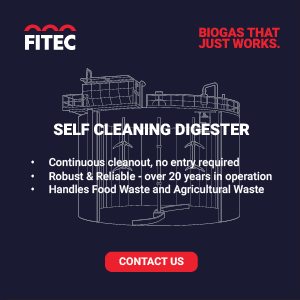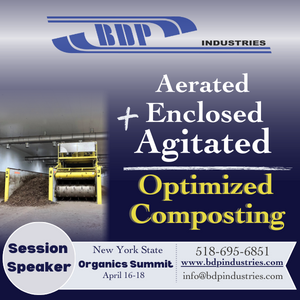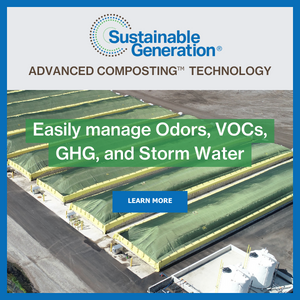Compost manufacturers in the Southeast and Midwest are capitalizing on their products’ inherent capabilities to build soil organic matter, retain moisture and provide nutrients.
Dan Emerson
BioCycle October 2013, Vol. 54, No. 10, p. 30
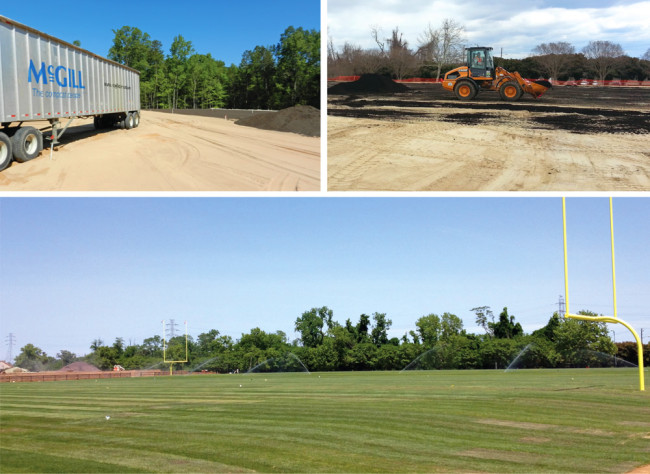
McGill SoilBuilder Premium Compost was used in construction of practice training fields for the Washington Redskins and the University of North Carolina-Charlotte. The fields were leveled, compost was spread and incorporated into the soil, and sod was laid on top.
Since opening in 2008, McGill-Waverly has, through a number of process improvements and materials management changes, succeeded in significantly reducing the operating footprint while at the same time increasing compost production. “This is central to our long-term strategy — smaller footprint and maximum process control lead to a better quality product and improved production costs,” says Gary Gittere, sales and marketing manager for McGill Premium Compost. The facility is equipped to make compost products year round for the most demanding markets — including the Washington Redskins professional football team.
Earlier this year, Earthworks and Sprinklers, Inc., a Richmond-based sports field builder, tilled McGill SoilBuilder Premium Compost into the existing soils at the Redskins’ new training camp fields in downtown Richmond. Two inches of compost were blended into four to six inches of soil, creating a good medium for the sod laid down on the field. In August, torrential rains inundated the training camp. The two practice fields held up under the heavy rain, while surrounding areas of the park — where no compost had been applied — were a soggy mess. McGill plans to capitalize on the positive exposure it’s gained from the Redskins case study. “We’re in the process of building a relationship with the landscaping firm that manages the Redskins practice fields to expand its use of McGill’s compost on other athletic fields they manage,” Gittere adds.
McGill has been working on the sports turf market for several years, beginning with the golf course management community, “which is very familiar with the use of compost,” Gittere notes, explaining that most sports fields are “not conducive” to quickly growing grass because of their sand- and clay-based soils. “Soil health is the number one thing we preach. All of the soil studies have shown it’s a function of organic matter. Top dressing with sand to fill in low areas is a traditional practice in sports field management. But we try to convince the athletic directors that just top dressing with sand does not provide the same results and value when using compost for their fields.”
The company stepped up its marketing in 2009, providing educational and awareness seminars for turf managers’ associations in the Virginia and North Carolina markets. Its focus is on educating turfgrass managers at athletic fields throughout these regions. One of its first such customers was an “open-minded” parks and recreation department in Virginia, which has used McGill premium compost for renovation and topdressing of its athletic fields since 2009. “A challenge for parks and rec departments is their fields are used so heavily there is limited ‘down time’ to establish turf in these heavily-worn fields,” explains Gittere. McGill currently has many customers using its compost to renovate and establish new soccer, football and baseball fields, including a number of private schools.
Along with impressive water conservation benefits, compost is ideal to add porosity to the heavy clay subsoil — with only 1 to 2 percent organic matter — that is prevalent on the East Coast, he adds. That also helps reduce the compaction of fields, which reduces the risk of player injury, including concussions. While compost is an ideal product for use on native soil practice fields, it may not necessarily be a good fit for some stadium fields where games are played, Gittere explains. That’s because these fields are designed for quick drainage and built with a sand-base. Compost’s moisture-holding qualities could counteract the intended design providing too much organic matter.
Another major sports turf client for McGill is the University of North Carolina-Charlotte (UNCC). Working through Carolina Green, a regional sports field developer, UNCC renovated its soccer fields and used McGill’s premium compost for the renovation. “Last spring they built a brand new football facility and used our compost on their two practice fields,” says Gittere. “The UNCC results have been very positive, leading to a discussion with their grounds people about topdressing their fields with our premium compost instead of sand, as they are currently doing.”
Golf Course Application
In Madison, Wisconsin, Purple Cow Organics has had significant success using compost on golf courses. Purple Cow has three yard trimmings composting sites in the Madison area, and three sites in the Milwaukee area, ranging in size from 8 acres to 20 acres. Two golf courses near Madison — The Meadows of Sixmile Creek in Wanaukee and Windwood of Watertown — are owned by Madison Golf and Development Group, LLC. Jeanne Whitish, president of Madison Golf and Development Group, is also CEO and an owner in Purple Cow Organics, so it made sense for the two courses to start using the compost for their landscaping and course maintenance needs.
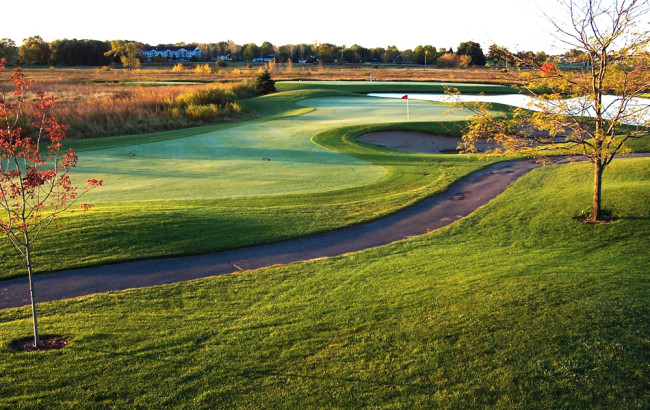
Within three years of when compost was first used on the fairways and tee boxes, the Meadows of Sixmile Creek golf course in Wanaukee, Wisconsin was able to replace 100 percent of its synthetic fertilization and 95 percent of its chemical herbicides. Compost is supplied by Purple Cow Organics.
A Turfco CR-10 is used to apply the compost as a topdressing twice a year — in the spring and fall. Three cubic yards of compost are applied for each acre of ground. The compost has been effective in providing the nutrients once supplied by fertilizer, at lower cost, Schultz says. “It took two or three years to get enough material in the soil, then we started seeing results.” One of the reasons maintaining healthy course grass is challenging is that the bent grass is cut to a half-inch height in most areas, which is shorter than a traditional, bluegrass lawn, he explains.
Madison Golf and Development Group, LLC also has been using Purple Cow compost on its Windwood Golf Club course, says Ryan Hartberg, Purple Cow’s director of operations. Each course uses about 200 yards of compost per season on its fairways, roughs and tee boxes. The course managers also use a sand-compost blend on greens after they are aerated, adds Whitish. “We’ve opted to utilize our courses as living laboratories, to deliver biology to the soil using compost.”
And the results of this compost use? “We’ve seen a reduction in thatch, and an increase in water holding capacity,” she reports. “Last year, we went through the worst drought of my lifetime — seven or eight weeks with no rain. But we came through it very well in comparison to the other courses in the area; we attribute the difference to the compost we had been applying.”
The Meadows course was developed in 1995 on property that included several farmed wetland areas of approximately 25 acres. “It had been farmed previously, but wasn’t functioning ecologically,” explains Whitish. “At the time, there was a lot of interest in reducing runoff to improve water quality and fish habitat, and controlling erosion. We mitigated these 25 acres into what now are working wetlands.” Madison Golf also purchased a conservation easement on the neighboring property, and enhanced that wetland area, which has been developed into a nature refuge.
Purple Cow’s owners now have their eyes on a new, potentially sizable market for their soil amendment products. Other golf course owners in Wisconsin are taking notice, notes Whitish. “Interest is beginning to build; we have done presentations to the Wisconsin Superintendents’ Association, and we continue to field inquiries. There’s a lot of appreciation for the fact we are working on reducing synthetic inputs and seeing healthier turf.”
Purple Cow sells its compost in truckloads, one cubic-foot bags, 2-yard “super sacks” and trial-size single-plant pouches. Several years ago, the company developed its “Select” compost, blended for ease of application in topdressing, overseeding and starting new lawns. “Our Select compost was originally developed through the golf course applications and through inquiries from people who were aware of that application,” she explains. “We began to offer it for topdressing and seeding in the commercial landscape market.”
Dan Emerson is a Contributing Editor to BioCycle.






